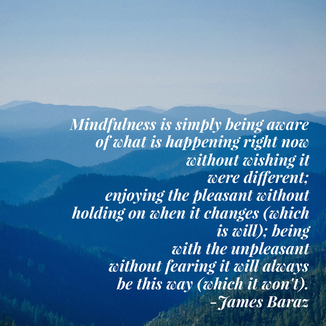|
And finally….Adjust Your Attitude!
· Your subconscious mind does not hear sarcasm. So how your speak and what you say influences how you feel about yourself. Eliminate saying “I am so stupid” when you do something wrong! Your subconscious believes you when you speak this way and it really does impact the way you and others feel about you. So eliminate words such as "always," "never," "should" and "must" these are telltale marks of self-defeating thoughts....no more "I always mess up," "I should complete everything on my to do list and much more," "I must go do X Y and Z right now". If you thought these were helpful or have any more strategies that you use, I would love to hear them, please use the comments section below.
0 Comments
Accept the Stressor
· Don’t try to control the uncontrollable o Trying to change the tide is not going to be possible and trying to fight it will exhaust you. So choosing to surf it, will be easier and a great deal more manageable. · Look for the upside. o Again, how do you want to look at things. Finding a positive in a bad situation is very stress reducing. Sometimes we need to stick it out in a job that we don’t like, but need it. Finding one small aspect of it and putting your head down and focusing on the positive aspect, even if that is the paycheck at the end of it, and planning your strategy of finding a new job. · Share your feelings. o Talking through the feelings to the right person can help you move towards acceptance and relieve the stress. If you are lucky, you have a friend that can help you laugh through it. · Learn to forgive. o Holding on to resentment is really like drinking poison and expecting the person you are angry with to die. Forgiveness is for you and not the other person. Walking through the stages of forgiveness is a journey and one where you will feel lighter at the end of. Adjust Your Standards
· Good Enough o There are times when it is more than acceptable for you to be okay with “good enough.” When you haven’t had enough sleep, and its been a long week and you just can’t lift a finger any more, be gentle with yourself and lower that very high bar you set for yourself. We go through bad times and we need to adjust our bar at times, and that is ok, and does not make you any less worthy or deserving as a human being. · Focus on the positive o Cheesy I know, but it’s true. There is a great deal to be grateful for and sometimes your mood can shift with a change in perspective. Remind yourself of what you do have and what went right that day. Not everything will be awful....find the light and focus on it. Adapt to the Stressor
· Reframe problems o Sometimes looking at a problem for a different perspective can be helpful. An example of this was the slow water dispenser at the last place I worked. It took a while to fill a water bottle up with drinking water, and it was easy to get frustrated with it. To reframe the event I chose to see my time filling up with water bottle as a couple of minutes where I got to just stand and reflect on my last session, or plan my next session without being interrupted or sidetracked by my screen or phone. Consequently I felt grateful to have the time to myself and not hassled by the ‘time wasted.’ · Look at the big picture- How important is it? o Will you remember the current annoyance in a weeks time? It is really worth getting that frustrated over? If the answer is 'no', then choose not to have a feeling over it. While moving countries, things did not go smoothly, and there were times when I just said “I am not going to have a feeling about this, life is too short, and I want to enjoy my day’ and I moved on. Alter the Stressor
· Express your feelings instead of bottling them up o Holding on to and stewing over negative feelings is a bad idea and can lead to unnecessary stress. Talking to the person that upset you is a way to show up for yourself and even if the other person did not hear your frustrations, you are worth standing up for. · Be willing to compromise o Sometimes we don’t get exactly what we want, and coexisting with other sometimes means we don’t get our way. It will lead to longer and happier and more harmonious relationships. · Be more assertive o Say what you mean, mean what you say, but don’t say it mean. Be very clear about what it is that you want to say. If you are gearing up for a difficult conversation then have one point that you want the other person to hear. Just one point. That way when the other person tries to deflect or change the subject you can bring them back to the point you are wanting them to hear. · Manage your time better o Stop trying to fit too much into your day. Be realistic with your time management. Showing up for things on time will feel better and be less stressful than constantly fighting the clock. Have no more than 4 things on your to do list for any given day. We all experience stress, the good the bad and the, at times, ugly. The good kind, a.k.a eustress is the kind of stress that is a bit exciting and can be motivating, such as getting engaged, receiving a promotion, about to present a talk that you have worked hard on. These elevate your heartbeat, fill your body with adrenaline and dopamine and lets your body know that things are happening, but these hormones quickly subside and you return to a homeostasis fairly quickly. The bad kind, is distress and is cumulative. Distress is an unhealthy relationship, a negative work environment, or facing bankruptcy. The body does not do well under long periods of time where cortisol (the stress hormone) is flowing through your bloodstream. It can lead to weight gain, immune system suppression, gastrointestinal problems, cardiovascular disease and fertility difficulties, so stress management is vital for maintaining good health and happiness.
Being able to recognise when you are experiencing long term stress side effects is key to change. Not everyone experiences that exact same side effects, but there is a cluster of symptoms; Insomnia, change in appetite, sexual disorders, aches and pains, frequent colds and flus, and feelings of intense long term fatigue. Here are 6 key strategies for managing stress. I call them the 6 A’s. Avoid the Stressor · Learn how to say ‘no’. o Every time you are asked to do something, say ‘NO.’ seems drastic I know, but if after you have thought about it, and you find that you can REALISTICALLY fit it in, then you can always go back and say ‘yes’. It is much easier than saying “I know I said I could do that for you, but now I can’t do it after all. · Avoid people who stress you out. o If you leave the company of someone and you consistently feel deflated, sad, angry, dismissed, just a bit 'ick'…then do yourself the favour of avoiding this person, they just aren’t that good for you! · Take control of your environment o If you don’t like where you live and you can reasonably do so, then move. If you have pictures that you have meant to put in frames and hang up, do it, don’t put it off any longer. If you know you need to change jobs to get away from the toxic work place send out those CVs, don’t put it off any longer. Take charge. · Avoid hot-button topics o When you go out with friends and there is a hot button topic that annoys you, ask to not talk about it. My friend recently went for dinner with friends who were also mothers and said “please can we not talk about our children during this meal,” and consequently had a wonderful conversation about other things. · Pare down your to-do list o Rather than feeling like you are constantly fighting with your to-do list do not put more than 3 things on it per day. Having a feeling of success at the end of the day will leave you feeling a whole lot better about what you accomplished. Burnout was a term first coined by Herbert Freudenberger in 1974. Occupational burnout is characterized by exhaustion, lack of enthusiasm and motivation, feelings of ineffectiveness, and can also have the dimension of frustration or cynicism, and as a result efficacy within the workplace is diminished. Burnout can look and feel very similar to Depression.
So how does Burnout start? And how can you recognize it and stop it from happening to you? The following are the phases and some questions to ask yourself; 1. The compulsion to prove your worth. Compulsion is defined as ‘an irresistible urge to behave in a certain way.’ Do you stay late at work even when everyone has left? Even when your friends have been texting you for the past hour to join them? Is it all so that you can prove to yourself or your boss that you do actually belong in the job that you were hired to do? Have you tried and failed to not do that one extra task that no-one really expects you to do? 2. Working harder Are your expectations of yourself set far higher than anyone else that is in your same position? Have you ever said ‘no’ to anything that you have been asked to do at work even though you have already taken on more than anyone else? Do you have a work/fun balance? Do you have weekends or a day off where you do no work whatsoever? Do you feel you need to make yourself irreplaceable at work? 3. Neglecting your needs. When was the last time you called your parents? Have friends stopped asking you out because they know you will say no anyway? Do you have time set aside in your week that is just yours? Do you go to the gym/workout? What does your self/care look like? 4. Displacement of Conflicts Have you ever caught yourself wondering why you are doing all of this? Do you catch yourself missing your friends and the fun you used to have with them? Unsure of why you are feeling slightly empty despite all the headway you have made in your career? Have you noticed that you are getting more headaches, feeling more exhausted and unsure why, feeling disproportionately angry at others? It’s in this stage that the first physical symptoms occur. You are becoming aware that you aren’t that happy but you are unsure what the cause is. 5. Revision of Values Has your job become your solitary focus? Do you make any time for anyone outside of work? What does your diet and exercise look like? How is your life at home? When was the last time you laughed/went to see a movie/danced or sang for no reason? If the answers to these questions are making you feel uncomfortable then your primary value system may have become your work. If you aren’t feeling anything at all recently that is the major symptom of this phase- emotional numbness. 6. Denial of Emerging Problems Have you become intolerant of any social function? Do you avoid other people? Feeling angry and acting aggressive with others? Blaming all your feelings and behaviours on the pressure of work? 7. Withdrawal Have the minimal social interactions you did have completely disappeared? Have you increased your alcohol and drug use, as they are your only release? Are you feeling the loss of hope? Where are you headed? 8. Obvious Behavioural Changes Think of the person you were in your early 20s, do you recognize who you are? Are you happy with how you are behaving? Have the people around you started to make comments? DO you get very different reactions from people than you used to get? 9. Depersonalization Does your life have value? Do other people have value? Has everything just become a series of mechanical functions? Are you just putting one foot in front of the other because you do not know what else to do? 10. Inner Emptiness Do you feel empty? Was is it all worth? Are you overeating? Over-exercising? Having excessive sex, just to feel something…anything? 11. Depression Feeling depressed? Feeling Lonely? Feeling burnout? Have you lost or gained a significant amount of weight? Feeling like there is no hope? Feeling completely indifferent about your life? Any feelings of suicidality? Are you exhausted all the time even if you get plenty of sleep? What meaning does life hold for you? Feeling guilty for no reason? Can’t sleep? Can’t get enough sleep? Have you lost interest in everything that you used to enjoy? 12. Burnout Syndrome At this stage you really need immediate medical attention! Physically and emotional exhaustion has taken its toll. If you recognize yourself in any of these phases you don’t need to get to phase 12 before you reevaluate your life and take action. If you find that you can’t do it on your own, ask someone for help. Let people into the struggle, you are not the first person to go through this and you don’t need to do it in isolation. Talking to a therapist can be a helpful first step to find new ways of thinking about work, and developing healthier coping strategies to deal with the stress. Mindfulness is a technique and when practiced can become a discipline of being in the moment. It is easy for us to get caught up in our thoughts, and plans for the future and anxieties of the past that we forget to be present. Our thoughts have a significant impact on how we feel and behave, which is why it is important to bring out minds back into our current physical state. When we are overwhelmed with worry about a potential future event, bringing ourselves back to this current minute and reminding ourselves that we are safe, and alive and that future we have imagined is not real and may never happen can help calm us down.
Professor Mark Williams, former director of the Oxford Mindfulness Centre states "An important part of mindfulness is reconnecting with our bodies and the sensations they experience. This means waking up to the sights, sounds, smells and tastes of the present moment. That might be something as simple as the feel of a banister as we walk upstairs.” You can practice mindfulness anywhere and in total stealth mode. As Dr. Williams suggests focus on your senses, touch, taste, smell, hearing, and sight. When you find yourself caught up in your thoughts and they aren't helping your mood, take some time to come back to the present and focus on how your clothes feel on your body (touch), the taste and texture of your food (taste), the smells of your home (smell), the noise of the tube on the tracks on your commute home (hearing), and really notice the people around you in the restaurant you are sitting in (sight). Have you found yourself going to a person you love feeling lonely or frustrated seeking comfort or a place to vent and then coming away feeling entirely unsatisfied with the response? The boyfriend you called to vent to was preoccupied, the parent did not hear your feelings and yet again gave you terrible advice. I call this ‘Going to the hardware store for milk.’ You go to the hardware store and say “do you sell milk here” and the store keeper says “No, we have nails and hammers and drills, but no milk” and you leave feeling disappointed and not getting any milk. A few days later you return to the store “Sir, do you sell milk?”, “No I’m sorry, we still don’t sell any milk. I can offer you building materials” and again you leave with no milk. This time you may even leave angry at the store for not having the milk, despite the fact that have now told you twice that they don’t have milk. Maybe it is you that needs to find a grocery store.
The problem we face in relationships is knowing who can give us what. Some people are supportive and kind, but they aren’t that useful when it comes to career advice. Others are great for a night out to have fun with, but they would not know how to help you cry after a break-up. For some reason we are better at knowing that our friend Will is good for cheering us up, and Sarah the best listener and choosing the right friend to go to. We, however, aren’t so good at seeing that mum for some reason really can’t take our career seriously and then are left wondering why she gives terrible career advice or offers us some money despite that fact that we make a very decent living. There seems to be a part of us that longs for the time when our parents were like superheroes, and they could do everything. Real maturity is reached when we have successfully individuated from our parents. Individuated, a term first coined by the psychologist Carl Jung, it means to become a whole, unique and separate being. When this individuation hasn’t been reached we often return to our parents believing they are omnipotent beings that have everything we want and need, and then leave disappointed that they are only human beings. An example would be going to a father for acknowledgement of achievements and being completely overlooked and dismissed, or going to a mother for positive reinforcement and encouragement and leave being told that you won’t succeed anyway so why try. It would be easy but also very painful to stay stuck in pointing a finger at the parents for not being better parents, but at what age do you need to take ownership and therefore responsibility of your needs and look for someone that can meet them? Now this is where some make a mistake of looking for a romantic partner to meet ALL of their needs. They don’t just want a grocery store for their milk, they want the hardware store as well, and the department store filled with clothes, and the toy store, and on and on, they want a store that has everything in Cash n’ Carry amounts! Can you imagine how overwhelming it would be to be that for someone? I am sure some of you have tried. The flip side of that coin is the disappointment and frustration of being in a relationship where all those needs aren’t met, and blaming the other person for not providing you those things? So what is the solution? Do we just not try for each other in relationships? Do we just say, “Hey, I don’t have that milk for you, go elsewhere!” No, all relationships should encourage us to grow as people, to extend ourselves further for those we love. However, we all have limits. If we could meet ALL each others’ needs all the time there would be no need for friends. However, when your boyfriend is busy on a Friday night and you want to vent about your incredibly frustrating day or week then call your friend! That way you will get your need met, you will not end up having an argument with your boyfriend that leaves you not only angry with your week but furious with your boyfriend. And when your girlfriend is busy at work and unable to talk to you about your frustrations with the job hunt, call a friend. Just because the person you are with doesn’t necessarily have any ‘milk’ right now, doesn’t mean they are not wonderful and great, it just means that you need to go elsewhere for that item. Relationships would feel so much better if we didn’t expect quite so much from them. Feeling like you are in a rut? Stuck in a comfortable but stale relationship? Is your career going nowhere? Have you stopped working out? Feeling stuck and like everything in your life is predictable and less than exciting? You are stuck in a rut, my friend. There are a few unhelpful thought patterns that can get in the way of doing anything about it. Here are a few: + The “Sunk-Cost’ Fallacy- Focusing on the time/money/effort you have already invested and ‘sunk’ into the venture/relationship/project already. This is called the “sunk-cost’ fallacy. Instead of sinking more of your precious resources into it, choose to leave but make sure you take all the valuable lessons and gifts with you. Even in failed attempts there are lessons, gifts and truths that you can take with you. If you leave with only anger and regret, you will miss all of those. + Stop Day Dreaming! - Getting stuck in day dreams may help you feel better for a few minutes but is unlikely to create real change. If you aren’t getting regular exercise it is unlikely you will wake up in the morning feeling fit and healthy. Day dreaming about yourself being that person who takes care of themselves is unlikely to change anything! + Intermittent reinforcement - The best predictor of future behaviour is past behaviour; just because there is an occasional and sporadic positive change by an employer or partner does not meant that the negative situation you are in will become better permanently. You have to objectively determine if things are getting better overall. Here are some strategies of getting out of that rut permanently: + No Such Thing as Perfection - Forget about trying to be perfect. Perfect really is the enemy of good enough. I am a real believer that not everything has to be done perfectly. If I felt that I had to be perfect at Pilates without ever having tried it, I would never have started (I’m never going to be perfect at it). There are times when I need to accept that what I can contribute is good enough for me today, and see my goal as progression and not perfection. + Make a Decision. When faced with multiple choices, the fear of making the ‘wrong’ decision can be paralyzing. The mountaineer Joe Simpson ( from the book and movie - Touching the Void) talks about being stuck in crevasse with a broken leg, almost dying because he was crippled by the decision to head left or right, one being the way out and the other was a dead end. He realized that not making any decision was worse than making a wrong decision because it meant he was giving up and not living. The ability to make decisions, even if they were wrong decisions made him feel like he was taking ownership and responsibility for his life, and if he made a wrong decision he could then decide to correct it, and make a different decision +Focus on the End Goal - Remember why you are doing this. The monotony and at times tedium of striving for a goal can lead you to forget why you even started in the first place. Having physical reminders in places that you see often can be helpful. Creating a vision board, posting inspirational images and quotes to places you look at often can help to focus on the greater goal. +Know what your comfort zone is - Moving out of your comfort zone is scary, so making small steps out of it can make the transition easier. To get a better visual, get a pen and piece of paper and draw 3 or 4 concentric circles, with you in the middle. In the circle right outside your own, list the activities you are very comfortable doing such as spending time with friends, going to see a movie, doing your day to day routine. In the next circle the activities that are a bit more scary but you would still do; go for a job interview, a first date, speak to someone new at a dinner party. In the next circle write things that really scare you, but if pushed you would maybe consider, and then in the last circle are your ‘hell no, not ever’ things. Working on expanding your comfort zone, and realising that fear is just a feeling and not what should stop you from growth and achievement. +Take a Good Break - There are times when you need perspective and refreshment. If you are making healthier food choices to get healthier, allow yourself the occasional ‘cheat’ meal, and really savour the experience. If you have been grinding away at a degree or work then give yourself a few days off, and have a change of scenery. You don’t need to go far to see something new and inspiring. + Talk to someone. If you find that you are still stuck, talk to a friend or your boss or your partner. Let other know how you are feeling. Often getting others involved can help you feel more understood and gain a greater feeling of accountability. If you find that you have tried this and still nothing has shifted and you have run out of ideas talking to a professional is a good option. Make an appointment with a psychologist/therapist, they can help you identify why you are getting stuck in the first place and how to work through it. Whenever a client comes to me for therapy, I will ask them what their goals are for therapy. This can be a nebulous question and one that some clients find difficult to answer, but it is vital that they do, because if you don’t know where you want to be, it can be hard to recognize when you actually get there. Goals can be anything from as simple as ‘I want to feel happier’ to ‘I want to know why I can’t leave a relationship that I am miserable in’ or ‘I want to understand why at the age of 37 my parents still push ALL my buttons.” To help my clients come up with goals or an idea of what is bringing them into therapy in the first place, I ask them the following question: Imagine that you leave this office and you go about the rest of your day as normal, and you go home tonight, and while you are asleep in your bed, I wave my magic wand. The magic wand I wave makes everything in your life the way you want it to be. When you wake up in the morning, how would you know that I had waved my magic wand? What would be different in your life? Would you feel happy about waking up? Would your kids smile at you more brightly? What career would you be pursuing? Who would you be dating, or be married to? Would you find yourself happy to be working out? How about you? How would you know I had waved my magic wand?
Symptoms?It depends on the type of anxiety disorder, but general symptoms include:
What causes it?Anxiety, like depression doesn't have a single cause. Like other brain illnesses, anxiety disorders may be caused by problems in the functioning of brain circuits that regulate fear and other emotions. Most likely it’s caused by a combination of factors that may include:
What is it?Some common Symptoms of Depression
What causes it?Depression doesn't have a single cause. Most likely it’s caused by a combination of factors that may include:
|
Categories |







 RSS Feed
RSS Feed
